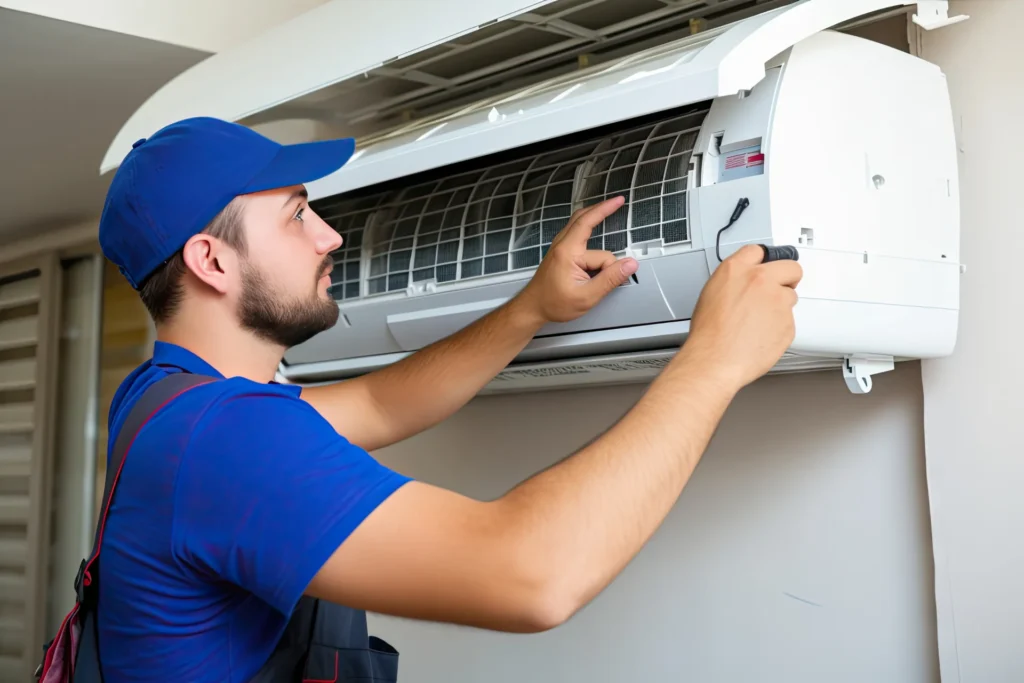As energy prices continue to rise and more homeowners seek ways to reduce their environmental footprint, improving the energy efficiency of your air conditioner has become a priority. Fortunately, there are several practical steps you can take to reduce energy consumption without sacrificing comfort. Whether you’re looking to cut down on energy bills or contribute to a greener planet, following these energy-saving tips will ensure your air conditioner operates as efficiently as possible.
In this blog, we’ll explore simple but effective strategies to help you optimise your air conditioning system’s performance, all while keeping your home cool and comfortable.
1. Routine Maintenance Is Key
One of the most important steps in improving energy efficiency is keeping your air conditioner in good working condition. Routine maintenance ensures that the system operates smoothly, minimising energy waste. Here are key maintenance tasks that can help:
Clean or Replace Air Filters Regularly
Dirty filters block airflow, forcing your system to work harder and use more energy. Clean or replace the filters at least every 1 to 3 months, especially during high-use periods like summer. A clean filter improves airflow, enhances efficiency, and maintains good air quality in your home.
Inspect and Clean Vents
Blocked or dirty vents can prevent cool air from circulating properly, which also strains the system. Make sure vents and registers are not obstructed by furniture, rugs, or curtains, and clean them regularly to ensure optimal performance.
Check the Outdoor Unit
Your outdoor air conditioning unit is exposed to dirt, leaves, and debris, which can clog the system and reduce efficiency. Keep the area around the unit clear and clean to allow proper airflow. At least once a year, consider having a professional inspect the condenser coils and fins to ensure everything is functioning as it should.
2. Set Your Thermostat Wisely
The way you set your thermostat can have a major impact on your energy bills. Many homeowners set their air conditioning to much cooler temperatures than necessary, which leads to increased energy consumption.
Optimal Temperature Settings
The ideal temperature for energy efficiency is between 24°C and 26°C for cooling during the summer months. Each degree lower than this can increase your energy usage by up to 10%. A higher temperature allows the system to cool effectively without working overtime.
Use a Programmable Thermostat
A programmable or smart thermostat allows you to set temperature schedules based on when you’re home or away. For example, you can program the thermostat to reduce cooling while you're out and ramp it up just before you return. This not only keeps your home comfortable but also prevents unnecessary energy usage during unoccupied hours.
Smart thermostats take it a step further by learning your temperature preferences and adjusting automatically. These advanced systems can help you save even more by optimising energy use throughout the day.
3. Improve Your Home’s Insulation
A well-insulated home helps keep cool air in and warm air out, reducing the strain on your air conditioner. Poor insulation can lead to significant energy loss, as your system works harder to maintain a comfortable temperature.
Seal Gaps and Drafts
Check for drafts around doors, windows, and any areas where cool air could escape or warm air could enter. Use weatherstripping and caulk to seal any gaps and cracks, which will help maintain a stable indoor temperature.
Upgrade Home Insulation
If your home’s insulation is outdated or inadequate, consider upgrading to more energy-efficient materials. Roof and wall insulation are particularly important, as these areas are most susceptible to heat gain in the summer. Investing in proper insulation can reduce your air conditioner’s workload and significantly lower energy bills.
4. Take Advantage of Shade and Ventilation
Your home’s environment can also impact how hard your air conditioner has to work. By creating a cooler indoor environment naturally, you can reduce the reliance on air conditioning.
Use Curtains and Blinds
Block direct sunlight by using window shades, blinds, or reflective window films. These will reduce heat from the sun, keeping your home naturally cooler and easing the burden on your air conditioner. Especially during peak sunlight hours, closing the curtains can make a noticeable difference in indoor temperature.
Ceiling Fans and Cross Ventilation
Ceiling fans are a great companion to your air conditioning system. They circulate cool air throughout the room, allowing you to raise the thermostat a few degrees without sacrificing comfort. In some cases, ceiling fans may even allow you to turn off the air conditioner altogether, especially in the evening when the outside temperature drops.
Additionally, take advantage of natural ventilation by opening windows in the early morning or late evening when outdoor temperatures are cooler. This helps reduce the indoor temperature without using energy.
5. Use Energy-Saving Modes and Features
Many modern air conditioning units come equipped with energy-saving modes or features that can help you cut down on energy consumption.
Eco Mode
Eco mode automatically adjusts the system’s performance to balance comfort and energy savings. When this mode is activated, the system reduces the amount of energy it uses by running less frequently while still maintaining a comfortable temperature.
Smart Air Conditioners
If you’re in the market for a new system, consider a smart air conditioner that connects to your smartphone or home automation system. These units allow for remote control, providing real-time energy reports and automatically adjusting to optimal settings based on current conditions.
Conclusion
Improving the energy efficiency of your air conditioner not only saves you money on energy bills but also extends the life of your system and reduces your environmental impact. Simple steps like regular maintenance, setting your thermostat wisely, enhancing insulation, and using natural cooling methods can make a big difference.
If you’re looking for professional advice or service to maximise your air conditioning system’s efficiency, Northend Air Conditioning can help. Contact us today to schedule a maintenance check or consultation and start saving on your energy bills.
